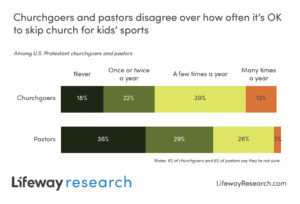
NASHVILLE, Tenn. (BP)–With all the talk about football this time of year, it seems appropriate to point out that a great “team effort” shouldn’t be reserved only for athletic fields.
When I’m speaking to a group of Sunday School teachers about organizing their classes, someone will invariably say, “We don’t have an outreach leader” or “We don’t have an inreach leader.” I always respond the same way: “Yes, you do!” You see, if you are the teacher and you don’t have someone in those or other positions, you ARE that leader. But, just like on a football field, one person can’t do it all. It’s crucial that you recruit and cultivate a team. Just having a name in each slot on the organizational chart isn’t enough to make a team; it takes effort. Here are a few quick principles of high performing teams:
— Time. Developing a high performance team takes time. Leaders need to invest some time with individual team members. The team also needs to spend time together. The ideal is a weekly planning meeting, perhaps on Sunday or Wednesday evenings. If you can’t meet that often, try every other week. Once a month is probably minimum for department or class teams to get together to plan and pray.
The entire Sunday School team needs to spend time together, too. Many churches plan a quarterly event for the entire leadership team as well as a major annual event. These meetings need to be well-planned and balance information and motivation. Is your team spending enough quality time together?
— Encouragement. The fuel that powers effective teams is relationships. Sometimes leaders get so busy caring for the needs of the flock, they neglect to take care of the shepherds. Often a timely phone call or a nice note in the mail can lift the spirits of a discouraged team member just enough to help that person keep going. Peeking in the door of a classroom for 2-year-olds and offering a wave, thumbs-up or quick word of thanks lets a team member in the trenches know he/she is appreciated.
Group leaders need a group leader (this is what you would call an “inreach” leader, and remember that you are it if no one else is on the list). But the inreach leader needs encouragement, too. The teacher, therefore, can serve as the group leader for the class team. Is your team practicing encouragement?
— Accountability. Effective teams have clear roles and responsibilities and hold each other accountable for performing against those expectations. There is one thing worse than a vacancy on your team: a filled vacancy. That is, someone who has the tile but doesn’t do the job. Often, the reason people don’t perform their jobs well is that the responsibilities were not fully communicated when the person was enlisted for the task. Establishing a clear description of what each team member is expected to do in the context of the assignments of every other team member is critical to developing a high performing team. Do you have clear job descriptions for each position? Have you communicated them effectively?
— Mission. High performing teams share a common purpose and goal: They are on mission to do something bigger and better than each team member could accomplish on his/her own. For Sunday School teams, a mission that compels is bigger than just showing up on Sunday mornings and going through the motions. It is, rather, a commitment to utilizing Sunday School as an intentional strategy to help people connect to the church, to Christ, to each other and to opportunities for ministry. It is a desire to help people discover the truths of God’s Word and the faith stories of others. It is a joint effort to create a climate and culture that makes every class a safe place to invite others.
Is your team built around a mission to help people invite, discover and connect?
–30–
David Francis is director of Sunday School at LifeWay Christian Resources of the Southern Baptist Convention.















